Utilities can shut off electricity for an alarming number of Americans for nonpayment in a heat wave, write and .
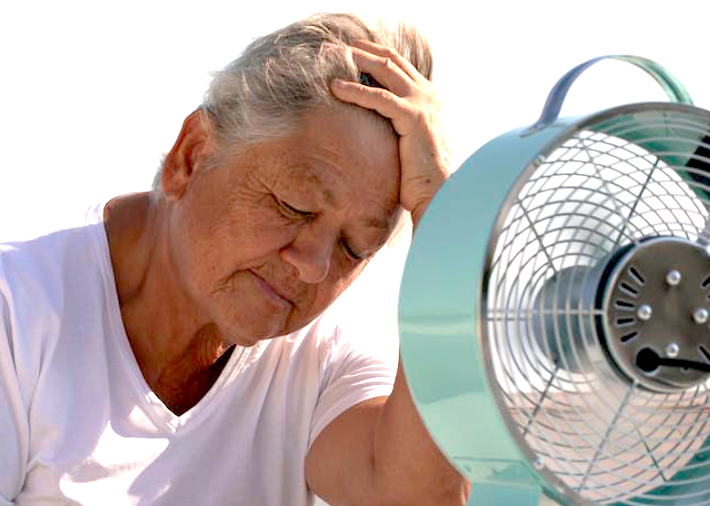
Low-income residents are among those most likely to lose cooling in their homes because they can’t pay their bills. (Solidcolours/iStock/Getty Images Plus)
By Sanya Carley and David Konisky
The Conversation

 Millions of Americans have already been sweltering through heat waves this summer, and forecasters warn of hot months ahead. July 3 and 4 were two of the hottest days, and possibly the hottest, on satellite record globally.
Millions of Americans have already been sweltering through heat waves this summer, and forecasters warn of hot months ahead. July 3 and 4 were two of the hottest days, and possibly the hottest, on satellite record globally.
For people who struggle to afford air conditioning, the rising need for cooling is a growing crisis.
An alarming number of Americans risk losing access to utility service altogether because they can’t pay their bills. Energy utility providers shut off electricity to at least 3 million customers in 2022 who had missed a bill payment.
Over 30 percent of these disconnections happened in the three summer months, during a year that was the fifth hottest on record.
In some cases, the loss of service lasted for just a few hours. But in others, people went without electricity for days or weeks while scrambling to find enough money to restore service, often only to face disconnection again.
As researchers who study energy justice and energy insecurity, we believe the United States is in the midst of a disconnection crisis.
We started tracking these disconnections utility by utility around the country, and we believe that the crisis will only get worse as the impacts of climate change become more widespread and more severe. In our view, it is time government agencies and utilities start treating household energy security as a national priority.
Constant Concern for 1-in-4 Households
Americans tend to think about the loss of electricity as something infrequent and temporary. For most, it is a rare inconvenience stemming from a heat wave or storm.
But for millions of U.S. households, the risk of losing power is a constant concern. According to the most recent data from the U.S. Energy Information Administration, 1 in 4 American households experience some form of energy insecurity each year, with no appreciable improvement over the past decade.
For many low-income households, the risk of a power shut-off reoccurs month after month. In a recent study, we found that over the course of a single year, half of all households whose power was disconnected dealt with disconnections multiple times as they struggled to pay their bills.
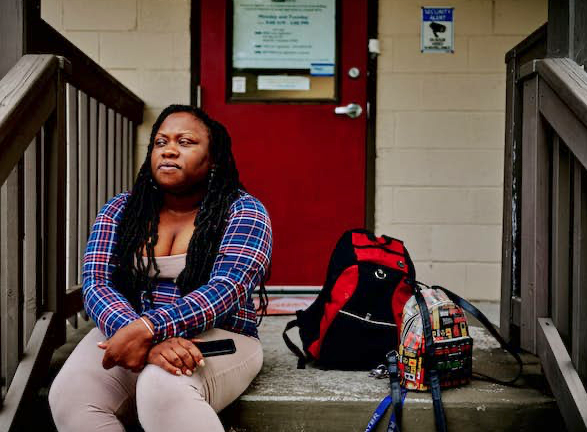
A woman sits outside the NeedLink Nashville offices after filling out an application to avoid losing electricity in 2022. (William DeShazer for The Washington Post via Getty Images)
Energy insecurity like this is especially common among low-income Americans, people of color, families with young children, individuals who rely on electronic medical devices or those living in poor housing conditions. During the first year of the Covid-19 pandemic, we found that Black and Hispanic households were three and four times, respectively, more likely to lose service than white households.
Along with existing financial constraints, people are facing rising electricity rates in many areas, rising inflation and higher temperatures that require cooling. Some also face a history of redlining and poor city planning that has concentrated certain populations in less efficient homes. Taken together, the crisis is apparent.
Coping Strategies Can Put Health at Risk
We have found that over half of all low-income households engage in some coping strategies, and most of them find they need multiple strategies at once.
They might leave the air conditioner off in summer, allowing the heat to reach uncomfortable and potentially unsafe temperatures to reduce costs. Or they might forgo food or medicine to pay their energy bills, or strategically pay down one bill rather than another, known as “bill balancing.”
Others turn to payday loans that might help temporarily but ultimately put them in deeper debt. In our research, we have found that the most common coping strategies are also the most risky.
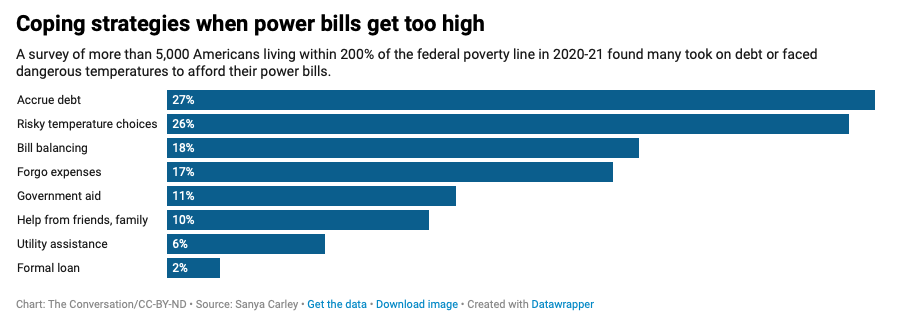
Once people fall behind on their bills, they are at risk of being disconnected by their utility providers.
The loss of critical energy services may mean that affected people cannot keep their homes cool — or warm during the winter months — or food refrigerated during any season. Shut-offs may mean that people with illnesses or disabilities cannot keep medicines refrigerated or medical devices charged.
And during times of extreme cold or heat, the loss of energy utility services can have deadly consequences.
Where Disconnection Rates Are Highest
Our research team recently launched the Utility Disconnections Dashboard in which we track utility disconnections in all places where data is available.
In recent years, more states have required regulated utilities across the country to disclose the number of customers they disconnect. However, state regulations only apply to the utilities that they regulate.
Public utilities and cooperatives, which serve over 20 percent of U.S. electricity customers, often aren’t covered. That leaves massive gaps in understanding of the full magnitude of the problem.
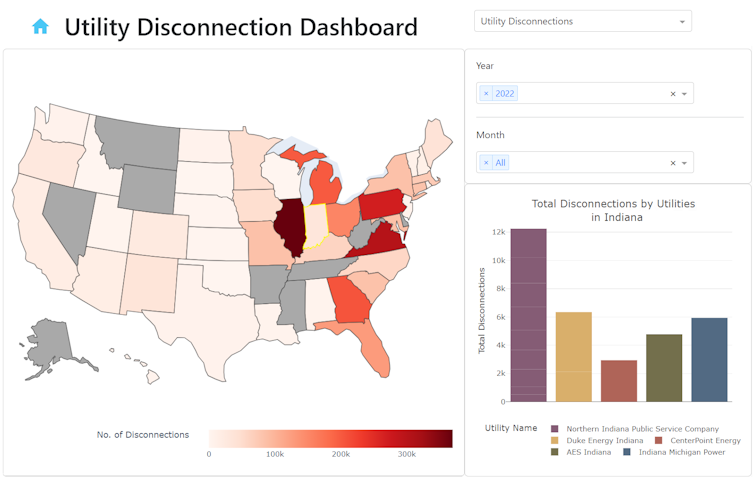
The Utility Disconnections Dashboard shows the number and rate of disconnections by utility in each state. (Energy Justice Lab, CC BY-ND)
The data we do have reveals that disconnection rates soar during the summer months and are typically highest in the Southeast — the same states that were baking under a heat dome in June and July.
Places with particularly high disconnection rates include Alabama, where the city of Dothan’s municipal utility has disconnected an average of 5 percent of its customers, and Florida, where the city of Tallahassee has a disconnection rate of over 4 percent.
Large investor-owned utilities in Florida, Georgia, South Carolina and Indiana also top the charts in disconnections, with average rates near 1 percent.
Only 19 States Restrict Summer Shut-Offs
State public utility commissions place certain restrictions on the circumstances when utilities can disconnect customers, but summer heat is often overlooked.
All but a handful of states limit utilities from shutting off customers during winter months or on extremely cold days. Most have at least some medical exemptions.
Yet, the majority of states do not place any limits on utility disconnections during summer months or on very hot days. Only 19 states have such summer protections, which typically take the form of designating time periods or temperatures when customers cannot be disconnected from their service.
We believe this is untenable in an era of climate change, as more parts of the country will increasingly experience excessive-heat days.
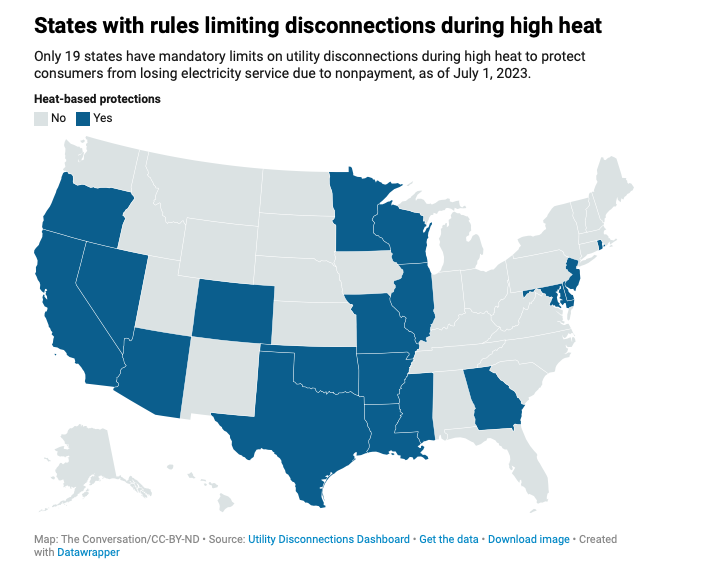
These state-level policies provide a baseline of protection. We learned during the Covid-19 pandemic that moratoriums that prohibit utility disconnections can alleviate energy insecurity by establishing a strong mandate against disconnections.
But these policies are highly variable across the country and particularly insufficient during hot summer months. Moreover, customer protections can be difficult for people to find and understand, since the language can be overly convoluted and confusing, placing additional an burden on already vulnerable Americans to discover for themselves how they can avoid losing service.
Better Rules & a New Mindset
As we see it, the U.S. needs more robust customer protections, with states, if not the federal government, mandating better disclosure of when and where disconnections occur to identify any systemic biases.
Most of all, we believe Americans need a collective change in mindset about energy access. That should start with a principle that all people should have access to critical energy services and that utilities should only shut off service to customers as a last resort, especially during health-compromising weather events.
The country cannot wait for deadly heat waves to prove how important it is to protect American households.![]()
Sanya Carley is presidential distinguished professor of energy policy and city planning, University of Pennsylvania. David Konisky is Lynton K. Caldwell professor, Indiana University
This article is republished from The Conversation under a Creative Commons license. Read the original article.
Views expressed in this article and may or may not reflect those of Consortium News.


Reports of at least 60,000 excess deaths in Europe due to heatwaves last year.
I do not know if there have been any similar studies in the USA.
The British government wants to put in prison people who are trying to do something about it by challenging the fossil fuel companies who have known about it for decades whilst pretending it was not happening.
So, the next logical step is to declare air conditioning a human right? What would the ‘Greens’ do or say about that?
The US is an extreme materialistic society, so the claim of ‘standing for human rights’ is pure hogwash. The only ‘human right’ is the right to make as much money as possible, regardless of off whose back.
How sad!
Too much money goes into weapons.
“it is time government agencies and utilities start treating household energy security as a national priority.” they would if they cared – but they don’t care! Not in the slightest.
If you rely on AC and the power company to cool you, the hottest day of the year is the day that the electricity goes to blackout or brownout or your air conditioner breaks. We have a couple generations worth of houses built to rely completely on energy-burning climate control, and residents will not be able to turn this around on a dime. However, there are ways that help cope:
1. Plant fast-growing and tall trees around the house, especially to the west and the south. Plant them to the east, too, if the heat is extreme. If it gets cold in the winter, deciduous trees may be best.
2. Vines on a sun-beaten wall can help as well.
3. Especially in dry areas, where night-time lows can be 30F or more lower than daytime highs, you have the option of opening doors and windows through the nighttime and shutting them up during the day.
4. If you do not get a wind, a window fan can draw air from the house. That gets the nighttime air in. Set the fan blowing outward in a window that can draw from the entire house. Open doors or windows across the house so that air passes through each area that must be cooled. This is a particularly handy way to get rid of air superheated by cooking.
5. Set a livestock watering trough outside under some trees or else fill up a tub indoors. When you start to overheat, submerge yourself in the cooler water. Make sure you get your trunk and a good part of your head under water; those are the key areas. Generally speaking, 45 minutes or so like this will increase your resistance to heat for the rest of the day, but repeat once or twice if necessary (usually right before sleep).
6. In dry areas, swamp coolers cool very effectively and use a lot less electricity than air conditioning. On that 108F day when the skys are bruised dark and ready to rain, you will need more help from something else, but they’ll get you through the dry heat.
7. In emergency, remember covered shopping malls, coffee emporiums, and public libraries. Their AC might black out too, but it might not do so at the same time. Plan to be somewhere in the early afternoon particularly, since the heat will generally be worst then.
8. Get solar panels and wind turbine generators and storage.
9. Get roof catch water systems, along with a good filter. A lot of heat stroke is caused in part by not drinking enough water.
10. Get a good light weight hat with a broad brim or stay out of the sun.
11. When you build or purchase a house, make sure that it is oriented properly with regards to the sun, so that it does or does not catch a lot of sun, depending on your climate.
Cheers from the Mojave Desert in California, and best of luck to everyone. Some of you-all are suffering a lot worse than we are this year. Most of these are things that we more or less all knew fifty years ago, and they still work. Free yourselves: these companies are not worth your trust.
We need to replace private owned utility companies with publicly owned utilities. Private greed is literally killing us.
indeed,until that day we must start looking out for one another,if someone is being evicted,as soon as the pigs leave the evicted should moved right back in,utilities turned back on,CAREFULLY re-energize homes,and protection from state and private forces needs to be formed,not many seem to understand just what we are looking at here,THE CHICKEN has come home to roost,we must FRY THE CHICKEN,the world may not get another chance to avert the coming conflagration
Any companies serving the public must NEVER EVER be in private hands – EVER!!! But privatization rolled over us with little chance to stop it: profits before people any time. And corrupt politicians contributed their ‘fair share’ of corrupting the entire set-up.
You guys have no idea what you are talking about.
Publicly owned utilities means the state.
During communism in my country we had a saying: “We have a tough choice ahead of us. Either we die of cold during in the winter or of hunger in the summer.”
State ownership, centralised ownership is just as bad as greedy corporate ownership.
Ultimately, the problem doesn’t lie with corporate owned or state owned, it lies with the people behind the systems.
There is a powerful scene in the TV series Dallas where JR Ewing plans a revolution in one Asian country to take back the nationalised oil fields Ewing Oil once owned. The hired mercenary begins to tell JR about what he plans to do to in that Asian country to which JR stops him in his track and tells him that he doesn’t want to know the (gory) details. That scene is a reminder that human conscience is what we need to truly cultivate in our cultures.
We can change systems 1000 times in the next 1000 years but if man has the same lack of conscious awareness about his actions things will always look the same.